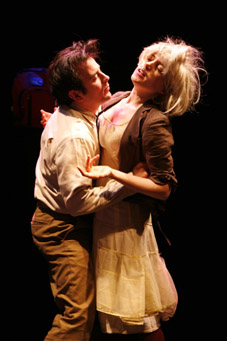pain relief for paranoia
keith gallasch sees major bang at the sydney opera house

Steve Cuiffo, Maggie Hoffmann, Major Bang
MAJOR BANG, FROM NEW YORK'S THE FOUNDRY THEATRE, IS MINESTRONE THEATRE, A WELL-BREWED, TASTY MIX OF PERFORMATIVE INGREDIENTS—STANDUP, MAGIC, IMPERSONATION, DOCUMENTARY AND MULTIMEDIA THEATRE, AND POSTMODERN DIVERSIONS ABOUT THE NATURE OF THEATRE IN THE FACE OF TERROR. ELSEWHERE IT'S BEEN LABELLED “POLITICAL CABARET.” BUT THERE'S A PLAY INSIDE MAJOR BANG. WOVEN THROUGH A VARIETY OF ROUTINES, IT'S ABOUT A FATHER'S FAILING RELATIONSHIP WITH HIS ADOLESCENT, SCIENTIST SON WHO IS IN THE THRALL OF A FASCIST BOY SCOUT LEADER, MAJOR BANG.
The father works in a food irradiation plant in New York, feels threatened by his son's superior intelligence and inadvertantly allows his security badge to be given by the boy to the scout leader whose intentions are terrorist. The tone is persistently comic, ironic and satirical, the playing virtuosic. Steve Cuiffo is our host, plays father, son and scout leader (in rapid alternations, even using a two-sided costume), mimicks a resurrected Lenny Bruce (rejecting a “war on terror”, he demands “a jihad on terror!”), executes deft magic routines and, with co-performer and fellow host Maggie Hoffman, wickedly corrupts the dialogue of a screened excerpt from the Kevin Costner vehicle, The Bodyguard. Hoffmann plays Cuiffo's boss and potential lover at the factory and demonstrates to us, with a gieger counter-cum-beat-box, that there's radiation in the theatre.
In direct reference to the Kubrick film Dr Strangelove, Major Bang is subtitled How I Learned to Stop Worrying and Love the Dirty Bomb. There's enough destructive energy (the equivalent of “three million chest x-rays” at any time) in the play's food irradiation plant to create another 9/11 horror and there's enough lunacy-at-home to pull it off (the performers tell the true story of a boy who invented a nuclear weapon in the family garage in 1995). The 'war on terror' campaign quickly becomes a nonsense, the US government's fear mongering embodied symbolically in a red backpack that hovers, glowing over the action and soon works its way into the narrative. It explodes, but because the company can't afford anything more than a sound effect, the plot line has to be diverted.
Although it ends with a heavy-handed solemnity after a suspenseful and very funny race to defeat Major Bang, the play's strength resides in its DIY approach to the challenge of dealing with the psychological and political consequences of terrorism. The creative recipe comprises whatever performative means are at hand. From the tacky showground set to card tricks, film clips and wild role doubling, Major Bang, alternatively quaint, arch and incisive, is ultimately a quick-witted lo-tech form of theatrical resistance to the US and (as the performers left us in no doubt) Australian governments' moneyed, monolithic hi-tech paranoia making. As the script puts it: “They tried to scare us but it didn't work. We took all the cars and planes and unattended bags, everything they had made dangerous, and we put them out of reach by turning them into jokes and stories.”
The Foundry Theatre, Major Bang, conceived and created by Melanie Joseph, Steve Cuiffo, Kirk Lynn, writer Kirk Lynn, director Paul Lazar, performers Steve Cuiffo, Maggie Hoffman; Adventures 07, Playhouse, Sydney Opera House, July 17-29
RealTime issue #81 Oct-Nov 2007 pg. on






